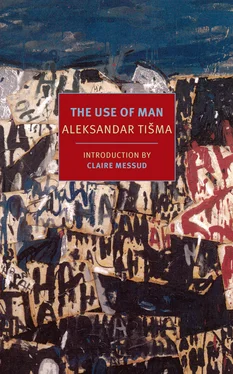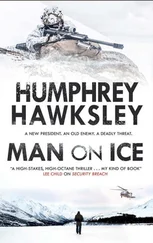Aleksandar Tišma - The Use of Man
Здесь есть возможность читать онлайн «Aleksandar Tišma - The Use of Man» весь текст электронной книги совершенно бесплатно (целиком полную версию без сокращений). В некоторых случаях можно слушать аудио, скачать через торрент в формате fb2 и присутствует краткое содержание. Год выпуска: 2014, Издательство: NYRB Classics, Жанр: Современная проза, на английском языке. Описание произведения, (предисловие) а так же отзывы посетителей доступны на портале библиотеки ЛибКат.
- Название:The Use of Man
- Автор:
- Издательство:NYRB Classics
- Жанр:
- Год:2014
- ISBN:нет данных
- Рейтинг книги:5 / 5. Голосов: 1
-
Избранное:Добавить в избранное
- Отзывы:
-
Ваша оценка:
- 100
- 1
- 2
- 3
- 4
- 5
The Use of Man: краткое содержание, описание и аннотация
Предлагаем к чтению аннотацию, описание, краткое содержание или предисловие (зависит от того, что написал сам автор книги «The Use of Man»). Если вы не нашли необходимую информацию о книге — напишите в комментариях, мы постараемся отыскать её.
A work of stark poetry and illimitable sadness,
is one of the great books of the 20th century.
The Use of Man — читать онлайн бесплатно полную книгу (весь текст) целиком
Ниже представлен текст книги, разбитый по страницам. Система сохранения места последней прочитанной страницы, позволяет с удобством читать онлайн бесплатно книгу «The Use of Man», без необходимости каждый раз заново искать на чём Вы остановились. Поставьте закладку, и сможете в любой момент перейти на страницу, на которой закончили чтение.
Интервал:
Закладка:
He felt an impatient urge to kill. The hands that moved back and forth beside him as he walked shook with the desire to clench someone’s throat; his index finger quivered to pull a trigger. But he could not shoot here. One could shoot only rarely, for even at the front, battles were infrequent. More often than not one marched, was transported, pitched camp, and when one did fire a gun, it was mainly into empty space, without a seen target, after the artillery and machine guns had obliterated ramparts of human bodies. Very rarely, into live human flesh, as at Dubno and Voryansk. Now once again those images of violence swam before his eyes, but ill-defined and reluctant, as if shaken up by his doubts along the way, and Sep arrived home ready to go to sleep but hesitant about himself as a killer. He unfastened the gate and the front door of the apartment and, trembling with hope that he would find someone to talk to, moved through the rooms. Everybody was asleep, his sister and the children; only Robert Kroner was still awake in his room.
Usually, when the others had gone to bed, Kroner listened to Radio London, but the news was bad: the German army was advancing in Russia, in Africa; England was being bombed; America had not entered the war. Switching off the radio, he hadn’t the strength to undress and lie down beneath the quilt, for he knew his thoughts would torment him and not let him sleep and that lying down would simply remind him of the common grave that lay in wait for him and his family. In such a mood, the appearance of Sep Lehnart had the effect of an apparition. It was as if the perpetrator of his worst fears was standing at the door, the embodiment of horror, brutality, bloodthirstiness. The shaven face shone in the electric light; each hair of the carefully cropped head stuck out evenly around the narrow skull with its flat ears; the shoulder tabs gleaming with silver; the boots black; the jacket fitted close to the body. And at the same time, behind this uniform, he could make out the well-known shape of his brother-in-law, so like that of his wife, almost identical with the features of his son, and that made the whole vision somehow monstrous.
And the effect that Kroner produced on Sep was also that of a flesh-and-blood ghost. Kroner sat there beneath the lamp, his Jewish features — long hooked nose; dark, dry skin — immobile, with sadness in his eyes, ready to give himself up to the knife or the bullet. As if he were already dead. The room around him was still; it, too, was dead, in harmony with the man to whom it belonged — like him, dark brown and faded from long usage. In one corner was the couch, prepared for the night, the upper corner of the quilt turned down, showing a white pillow and sheet like bared teeth. Beside it, the radio, a dark round ring on the mesh of its speaker, where over many years the currents of sound had left their mark. Behind, a wall filled with bookshelves, from which gilt titles in Latin and Gothic letters gazed down gravely, names of great writers Sep dimly remembered from his schooldays, an alien, inaccessible world one had to immerse oneself in for years to understand. Each object had its place, nothing could be moved without being noticed, everything was fixed forever, and not even death would be able to dislodge it.
Hesitantly, in a half-whisper, Sep asked his brother-in-law if he could sit down. He began by complaining that he had not had a good time in town today, that his leave had afforded him no fun or enjoyment. For this he blamed the townspeople. “They didn’t want to have anything to do with me,” he said slowly, expressing the thought with difficulty. “They avoid me; they don’t want to sit at the same table with bloodthirsty Sep.” His Adam’s apple bobbed up and down his thin neck. “Bloodstained hands aren’t wanted here. Here you have to have white hands, fine, noble hands, good manners, elegant ways. But no one asks if life has given Sep the chance to learn any manners.” He spoke directly to Kroner, with whom he had never been on intimate terms. “But you know, and you can tell them”—he bowed his head imploringly—“who Sep is and what he’s been through. The Jewish hydra”—he hissed, aware that he should not speak too loudly because of those sleeping nearby, and troubled by the knowledge, dulled by alcohol, that he was talking to a Jew—”the Jewish hydra in the shape of the merchant Solomon Heim ensnared young Sep in its web, to squeeze him dry and drag him down into the vile slavery of the god Mammon, the filthy god of money, of Wall Street, of Jerusalem, the god of the rabbis. But the German genius came down from heaven, the blond angel of Christian purity, to save young Sep. He put a rifle in his hand and said: Kill! As the Holy Scripture says, an eye for an eye, a tooth for a tooth. For every hungry German, for every German girl defiled by a hairy Jew, hundreds of Jewish and Bolshevik heads, hundreds of their maidens in our soldiers’ beds!
“Come on, Sep, wake up, the alarm’s been sounded. Put on your uniform, grab your rifle, fall in, climb into the truck, go outside town where the grave’s been dug — a grave as big as this house — one hundred and thirty young Jews dug it for a whole day, till midnight, and now they’re kneeling at the edge of the hole. Floodlights are shining on them from all sides into the depths of the black pit. We get out of the truck and move toward the pit, in formation, behind the backs of the men kneeling; the command is given and we load our rifles, and then another command and we press the muzzles to the back of the young heads and we fire. Without a sound the bodies roll into the pit. We reload our rifles while hundreds more appear in the beams of the floodlights, Jews, Jewesses, and little Jewish children. They come slowly toward us, like a chain that you let slip link by link through your fingers. They come and we load, waiting to see who we’ll get, like a lottery. It might be an old man mumbling his prayers, or a young man as full of strength as a lynx; it might be a beautiful woman, a lovely girl with soft, golden-brown flesh, or a child who knows nothing and cries out to you: `Uncle, uncle! Dear uncle, don’t!’
“But you fire all the same, no matter who it is; you feel the shudder of that life, of that death, you feel that with every bullet you’re wiping a monster, a piece of filth off the face of the earth, cleansing the earth of vermin, of greasy corruption, of serpents who tried to drag the Germans down into their dirty game of racial degeneration and subjection to naked materialism. But there’s no end to them, Brother-in-law, no end at all. Do you know what it’s like when there’s no end to something? Even if it’s something good, that you accept with all your heart? You know what it’s like when you have too much good, honest food, and it fills your stomach — no, your whole being right up to your eyelids? That’s what it’s like, killing all night long. Bang, bang! A bullet in the back of the head. First you stand, then you have to squat, because of the ache in your legs, and you order them to squat, too. Then your hands begin to shake, and you feel there’ll never be an end to all the flesh that comes up to the pit and passes before you, the scraping of shoes, the sighing, until the one intended just for you stops right in front of your rifle barrel. You fire, and the others fire, and in the flash of your rifle you see that down there, in the pit, bodies are moving. You don’t know whether you’re imagining it or not — that they’re not finished off, not properly killed, that they’re going to crawl out of the pit back into the floodlights, first their fingers and fists, then their bloodstained faces. They’ll push down on their hands, haul their trunks to the edge, force their knees up over it, and crawl out on all fours like lizards. What do you do then? You fire into the pit out of fear. Then, not waiting for the chain to form again, you shoot at the first one over the edge, then indiscriminately, at everything that belongs to this monstrous breed. But there’s no end to it, you see, no end to it, and when the truck takes you back into town at dawn, you see the houses and you’re afraid that they’re still full of that vermin and that you’ll never be able to exterminate them for good.”
Читать дальшеИнтервал:
Закладка:
Похожие книги на «The Use of Man»
Представляем Вашему вниманию похожие книги на «The Use of Man» списком для выбора. Мы отобрали схожую по названию и смыслу литературу в надежде предоставить читателям больше вариантов отыскать новые, интересные, ещё непрочитанные произведения.
Обсуждение, отзывы о книге «The Use of Man» и просто собственные мнения читателей. Оставьте ваши комментарии, напишите, что Вы думаете о произведении, его смысле или главных героях. Укажите что конкретно понравилось, а что нет, и почему Вы так считаете.












